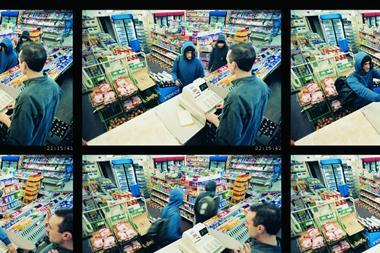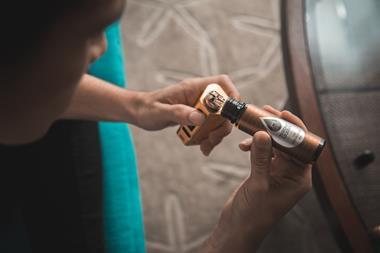It has long been implied that one of the biggest advantages small shops have over their larger rivals is friendly service. The most common boasts of the small store owner are: "We know all of our customers by name" or "You wouldn't get service like that at Tesco".
In many circumstances this is the case. The general perception of independent retailers is that they do offer friendlier service and more personal care than the major supermarket chains. However, the multiples are continually looking to expand into the convenience sector and at the core of their offer lies strict professional standards in terms of both their stores and their staff.
National Customer Service Week was celebrated at the beginning of this month, and I wonder how many of you made a special effort during October 2-8? Not very many I would suspect, but that is not the point as for small shops, customer service is generally delivered at a high level every day, 52 weeks of the year, rather than just a designated few.
Independents and c-store operators can no longer simply fall back on the theory of 'small good, big bad' and must make sure that their customer service is as good, if not better, than that experienced in a Tesco Express or Sainsbury's Local.
Kevin Maxfield, managing director of Association of Convenience Stores' approved training provider The Belmont Group, says that those independent retailers who aren't seriously looking at training and customer service will prove to be those most vulnerable to the multiples' onslaught.
"When it's difficult to compete on price, customer service becomes the main tool for competing against the big boys," explains Maxfield. "Stores that take customer service seriously can expect to increase sales, reduce wastage and will be generally more focused on selling. Those that don't will just be blindly trying to keep going forward in an ever more difficult market."
Maxfield, whose group has worked with Spar, Costcutter, Nisa-Today's, Musgrave Budgens Londis and the Co-operative Group, says that good customer service is much more than a smile or knowing a shopper's name. He claims it is understanding customer needs and developing key selling skills around them.
He argues: "Whether it's remembering all the promotions, being knowledgeable about products and being able to suggest suitable alternatives, it is all about getting staff to understand the value of good service and how to use it."
Guaranteeing a friendly face in-store has become a major focus for big symbol operators and, recognising the threat of the supermarket groups in this area, retail group Spar has acted on the need for retailers to adopt a minimum standard of customer service. It wanted to make certain aspects of service a given in every store and at the end of last year launched a SPARkling Service training programme to ensure this.
Spar corporate development director Philip Marchant explains: "One of the areas that we can differentiate ourselves from the competition, particularly the multiples, is in our people and how we interact with
our customers. We need to grow
our business by making the most of our staff."
The aim of the scheme is to ensure that stores provide customers with genuine, friendly and efficient service. Customers should expect stores that are clean and clutter free; where they will be treated as individuals and will be served by approachable and professional staff.
Going further, customers should be able to expect excellent knowledge of products and promotions from all staff. They should also be served efficiently and quickly without queuing, and will know that their complaints and enquiries will be dealt with respect. These people-focused initiatives are to be combined with quality of range and availability.
Mark Cleary is one of the first retailers to have tried out the programme and has been hugely impressed with the results. Mark, who owns a Spar store in Wigan, reports: "It is so easy to implement and the staff found it fun. It has reduced absenteeism and staff turnover has fallen to zero. It has brought the staff closer together and there is no doubt that we are much more of a team now. It also really helped me as, by spending more time with the staff, I now have a better understanding of their needs and ambitions."
Even more critically than the feel-good factor in the store, Mark has noticed a real difference to his bottom line and adds: "Sales have continued to rise above initial expectations."
When Scottish Spar retailer Iain Lansburgh trialled SPARkling Service in his nine Fife stores, he too enjoyed excellent results. Over a 20-week period, like-for-like sales were up 8.3% while staff turnover fell from 70% to just 29%. On top of this, Iain agrees that the training delivers better communication between staff and creates a happier working environment for everyone.
One of the benefits of the Spar course is that retailers can follow it in their own time in their own stores. Of course, affiliated c-stores like this will be better placed to take advantage of training provisions than independents, who may feel they neither have the cash nor the time to invest in training and don't have access to such schemes. Kevin Maxfield believes wholesalers could do more to help: "They should be out there actively supporting independent retailers. This can be a great way of sharing good market intelligence."
Maxfield adds that cost and time needn't be barriers, either. "Retailers need to find the right training package to suit them," he explains. "It is often the case that they will not have to leave their stores. Training can be done through learning work books and often colleges will come round to individual stores."
He also advises retailers to contact their local colleges to see what courses are on offer. He explains that there are a number of government grants available as part of a wider policy to boost neighbourhood businesses. These, he says, can either be used to put towards the costs of attending courses or fund a place.
One independent retailer who has taken advantage of this kind of scheme is Panakin Patel, owner of Kandies Newsagents in Crawley, West Sussex. Panakin has just completed a Retail NVQ run by the West Sussex Learning Partnership. He was able to take advantage of a European Social Funding grant and therefore got to take part for free as well as securing more money to cover the extra staff he had to lay on while he was attending the training course.
The course covered customer service, health and safety as well as tips on running a business and proved genuinely beneficial. "It was very helpful," admits Panakin, "I've been a retailer for 11 years and think I know how to run a business, but it is always good to learn something new."
He says that the customer service aspect of the course was useful and he picked up a few handy tips which he hopes to incorporate into his business. "I already knew a lot of what we were told on the course, but I think it would be especially useful to younger retailers who are just starting out. They can definitely learn something about service and it could be important when taking on the likes of Tesco," Panakin says.
The best thing about the course for Panakin is its make-up. He spent only a few hours away from his store and the college supplied workbooks for him to go through and then came out to collect them. He says: "It was really easy to do. I don't think I would have been able to go through with it if I had to spend more time away from the store. I can't afford to be away for too long. The fact that it was free made it even better."
The opportunities for retailers to boost their customer service are certainly out there and an improvement can be achieved without too much expense or disruption to a store, so there seems little excuse for not investing in this crucial aspect of retailing. As Kevin Maxfield suggests, those retailers not taking this seriously are the ones who are likely to have a serious problem on their hands sooner than they think.
The Association of Convenience Stores has also identified customer service as a major priority for the future success of retailers. But it is not just a matter of setting standards; the ACS sees successful c-stores as those which can go the extra mile and take customer service to a level that the less flexible multiples simply can't follow.
ACS public affairs director James Lowman claims: "Fast and friendly service is key to a successful store. But customer service is not just about a smiley face. It is about becoming part of a neighbourhood and earning your position within the community. This is why we launched our Community Heroes Awards last year, as we felt it is important to recognise the great work that c-store retailers do."
Bhoo Patel, owner of Philog Stores in the Whitchurch area of Cardiff, says that whenever his regular customers are ill, they will telephone his store and ask him to make up an order that he drops round when the store is not too busy. Bhoo says he his happy to do this and argues that the response would be very different if someone made the same call to a Tesco Express.
This really is a case of "You wouldn't get service like this at Tesco" and there are thousands of
c-stores out there who deliver this level of service to their customers.
The key is knowing what customers want and being prepared to go the extra mile to give it to them. In this way, the ACS will have a great many heroes to recognise in the future and the c-store sector will remain strong despite the attentions of the big guns.
In many circumstances this is the case. The general perception of independent retailers is that they do offer friendlier service and more personal care than the major supermarket chains. However, the multiples are continually looking to expand into the convenience sector and at the core of their offer lies strict professional standards in terms of both their stores and their staff.
National Customer Service Week was celebrated at the beginning of this month, and I wonder how many of you made a special effort during October 2-8? Not very many I would suspect, but that is not the point as for small shops, customer service is generally delivered at a high level every day, 52 weeks of the year, rather than just a designated few.
Independents and c-store operators can no longer simply fall back on the theory of 'small good, big bad' and must make sure that their customer service is as good, if not better, than that experienced in a Tesco Express or Sainsbury's Local.
Kevin Maxfield, managing director of Association of Convenience Stores' approved training provider The Belmont Group, says that those independent retailers who aren't seriously looking at training and customer service will prove to be those most vulnerable to the multiples' onslaught.
"When it's difficult to compete on price, customer service becomes the main tool for competing against the big boys," explains Maxfield. "Stores that take customer service seriously can expect to increase sales, reduce wastage and will be generally more focused on selling. Those that don't will just be blindly trying to keep going forward in an ever more difficult market."
Maxfield, whose group has worked with Spar, Costcutter, Nisa-Today's, Musgrave Budgens Londis and the Co-operative Group, says that good customer service is much more than a smile or knowing a shopper's name. He claims it is understanding customer needs and developing key selling skills around them.
He argues: "Whether it's remembering all the promotions, being knowledgeable about products and being able to suggest suitable alternatives, it is all about getting staff to understand the value of good service and how to use it."
Guaranteeing a friendly face in-store has become a major focus for big symbol operators and, recognising the threat of the supermarket groups in this area, retail group Spar has acted on the need for retailers to adopt a minimum standard of customer service. It wanted to make certain aspects of service a given in every store and at the end of last year launched a SPARkling Service training programme to ensure this.
Spar corporate development director Philip Marchant explains: "One of the areas that we can differentiate ourselves from the competition, particularly the multiples, is in our people and how we interact with
our customers. We need to grow
our business by making the most of our staff."
The aim of the scheme is to ensure that stores provide customers with genuine, friendly and efficient service. Customers should expect stores that are clean and clutter free; where they will be treated as individuals and will be served by approachable and professional staff.
Going further, customers should be able to expect excellent knowledge of products and promotions from all staff. They should also be served efficiently and quickly without queuing, and will know that their complaints and enquiries will be dealt with respect. These people-focused initiatives are to be combined with quality of range and availability.
Mark Cleary is one of the first retailers to have tried out the programme and has been hugely impressed with the results. Mark, who owns a Spar store in Wigan, reports: "It is so easy to implement and the staff found it fun. It has reduced absenteeism and staff turnover has fallen to zero. It has brought the staff closer together and there is no doubt that we are much more of a team now. It also really helped me as, by spending more time with the staff, I now have a better understanding of their needs and ambitions."
Even more critically than the feel-good factor in the store, Mark has noticed a real difference to his bottom line and adds: "Sales have continued to rise above initial expectations."
When Scottish Spar retailer Iain Lansburgh trialled SPARkling Service in his nine Fife stores, he too enjoyed excellent results. Over a 20-week period, like-for-like sales were up 8.3% while staff turnover fell from 70% to just 29%. On top of this, Iain agrees that the training delivers better communication between staff and creates a happier working environment for everyone.
One of the benefits of the Spar course is that retailers can follow it in their own time in their own stores. Of course, affiliated c-stores like this will be better placed to take advantage of training provisions than independents, who may feel they neither have the cash nor the time to invest in training and don't have access to such schemes. Kevin Maxfield believes wholesalers could do more to help: "They should be out there actively supporting independent retailers. This can be a great way of sharing good market intelligence."
Maxfield adds that cost and time needn't be barriers, either. "Retailers need to find the right training package to suit them," he explains. "It is often the case that they will not have to leave their stores. Training can be done through learning work books and often colleges will come round to individual stores."
He also advises retailers to contact their local colleges to see what courses are on offer. He explains that there are a number of government grants available as part of a wider policy to boost neighbourhood businesses. These, he says, can either be used to put towards the costs of attending courses or fund a place.
One independent retailer who has taken advantage of this kind of scheme is Panakin Patel, owner of Kandies Newsagents in Crawley, West Sussex. Panakin has just completed a Retail NVQ run by the West Sussex Learning Partnership. He was able to take advantage of a European Social Funding grant and therefore got to take part for free as well as securing more money to cover the extra staff he had to lay on while he was attending the training course.
The course covered customer service, health and safety as well as tips on running a business and proved genuinely beneficial. "It was very helpful," admits Panakin, "I've been a retailer for 11 years and think I know how to run a business, but it is always good to learn something new."
He says that the customer service aspect of the course was useful and he picked up a few handy tips which he hopes to incorporate into his business. "I already knew a lot of what we were told on the course, but I think it would be especially useful to younger retailers who are just starting out. They can definitely learn something about service and it could be important when taking on the likes of Tesco," Panakin says.
The best thing about the course for Panakin is its make-up. He spent only a few hours away from his store and the college supplied workbooks for him to go through and then came out to collect them. He says: "It was really easy to do. I don't think I would have been able to go through with it if I had to spend more time away from the store. I can't afford to be away for too long. The fact that it was free made it even better."
The opportunities for retailers to boost their customer service are certainly out there and an improvement can be achieved without too much expense or disruption to a store, so there seems little excuse for not investing in this crucial aspect of retailing. As Kevin Maxfield suggests, those retailers not taking this seriously are the ones who are likely to have a serious problem on their hands sooner than they think.
The Association of Convenience Stores has also identified customer service as a major priority for the future success of retailers. But it is not just a matter of setting standards; the ACS sees successful c-stores as those which can go the extra mile and take customer service to a level that the less flexible multiples simply can't follow.
ACS public affairs director James Lowman claims: "Fast and friendly service is key to a successful store. But customer service is not just about a smiley face. It is about becoming part of a neighbourhood and earning your position within the community. This is why we launched our Community Heroes Awards last year, as we felt it is important to recognise the great work that c-store retailers do."
Bhoo Patel, owner of Philog Stores in the Whitchurch area of Cardiff, says that whenever his regular customers are ill, they will telephone his store and ask him to make up an order that he drops round when the store is not too busy. Bhoo says he his happy to do this and argues that the response would be very different if someone made the same call to a Tesco Express.
This really is a case of "You wouldn't get service like this at Tesco" and there are thousands of
c-stores out there who deliver this level of service to their customers.
The key is knowing what customers want and being prepared to go the extra mile to give it to them. In this way, the ACS will have a great many heroes to recognise in the future and the c-store sector will remain strong despite the attentions of the big guns.
























No comments yet